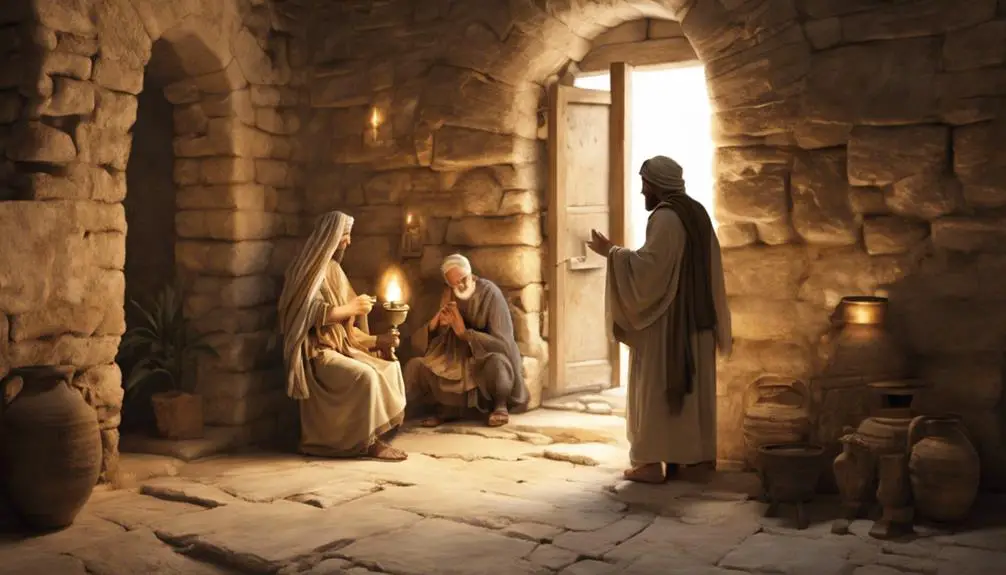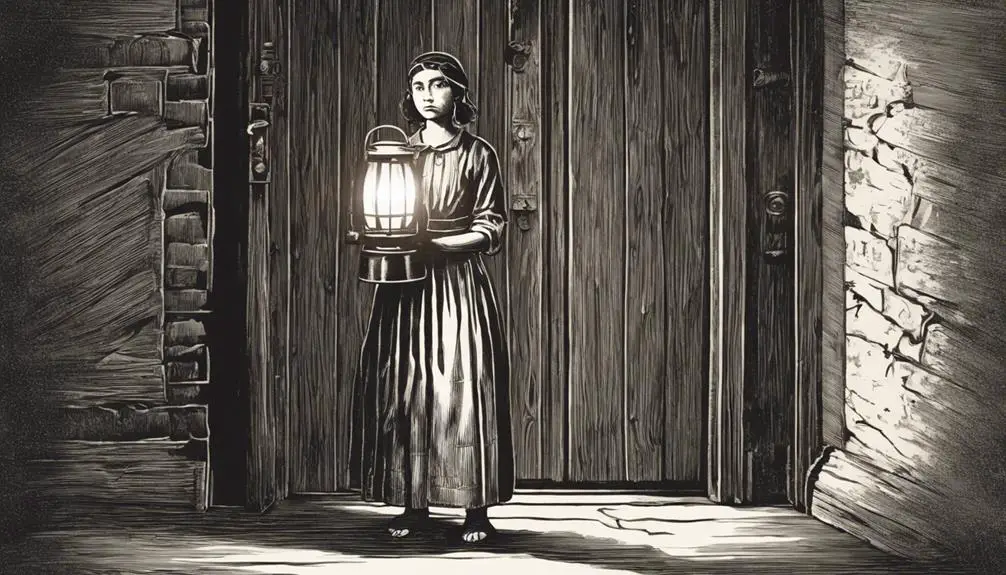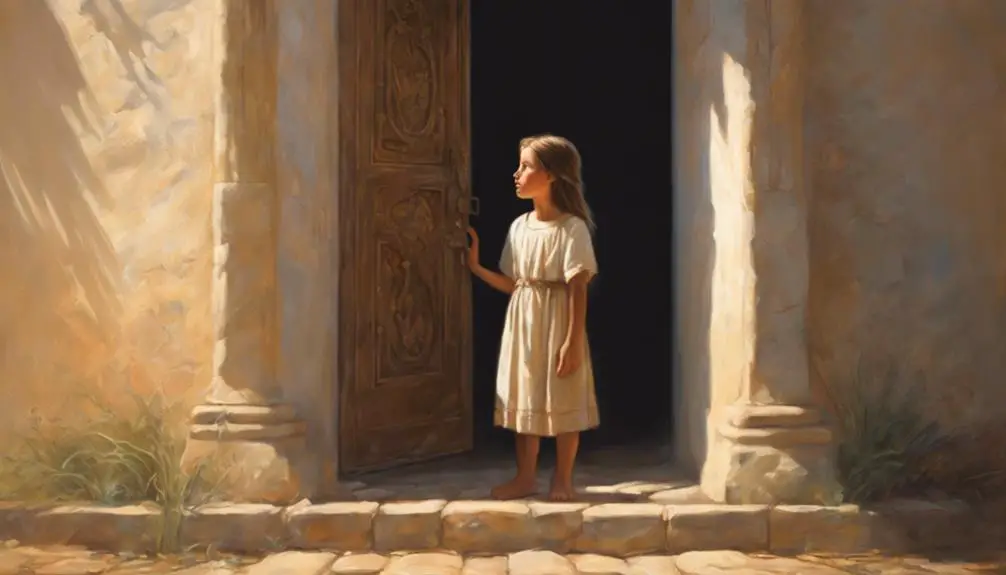Kneeling at faith's threshold, Rhoda's encounter with Peter reveals unexpected lessons in belief and the pivotal roles of women in biblical narratives.

Rhoda in the Bible
Have you ever pondered the real significance behind Rhoda's brief, yet memorable appearance in the Bible?
In the early Christian community, her story unfolds with a mix of humor and profound faith, as she becomes the unexpected herald of Peter's miraculous escape from prison.
You might wonder why such a minor character's actions hold any importance at all. Yet, as you explore her story, you'll find layers of meaning that resonate deeply with the themes of faith, recognition, and the role of women in the early church.
Let's peel back these layers together, uncovering insights that might just challenge your understanding of biblical narratives.
Key Takeaways
- Rhoda's story highlights the role of faith and joy in recognizing and responding to divine interventions, regardless of societal status.
- Her actions challenge traditional gender roles, illustrating the inclusivity and evolving dynamics within the early Christian community.
- Rhoda's experience provides insight into the emotional and spiritual life of early Christians, underscoring the human element in biblical narratives.
- Through Rhoda, the Bible teaches that unexpected encounters with the divine can foster unity and strengthen faith within a community.
The Setting: Early Christian Community

In the aftermath of Jesus Christ's crucifixion and resurrection, the early Christian community found itself navigating a complex socio-religious landscape, characterized by a fervent belief in the imminent return of Christ. This belief significantly influenced community dynamics, fostering a sense of urgency and unity among believers. You'd observe that the community sought to live out Christ's teachings collectively, often sharing possessions and meeting regularly for worship and fellowship.
However, this period wasn't without its challenges. Apostolic challenges, in particular, were prominent. The apostles, as the foundational leaders, grappled with the task of spreading the gospel while maintaining the unity and purity of the burgeoning community. They faced external pressures from both Jewish and Roman authorities, skeptical of this new sect, and internal disputes over doctrinal and practical issues. Moreover, the task of integrating Gentile converts posed significant questions regarding the community's identity and practices.
These dynamics created a backdrop of fervent faith tested by both internal and external struggles, shaping the early Christian community's identity and mission. Your understanding of this setting provides essential context for comprehending individual narratives, such as Rhoda's, within the broader tapestry of early Christian history.
Rhoda's Biblical Appearance
Rhoda, a young woman in the early Christian community, emerges in the narrative of the Acts of the Apostles, capturing attention with her unique role during a critical moment. Her appearance is brief yet significant, offering insights into her character and the cultural context of her time. Here's an analysis:
- Character Analysis: Rhoda displays youthful exuberance and a deep faith in the miraculous. Her actions reflect a genuine, unguarded response to the divine workings she witnesses, showcasing her as a symbol of innocent faith within the nascent Christian community.
- Cultural Context: Positioned as a servant, Rhoda's role illuminates the social hierarchies and household structures of the early Christian era. Her interaction with the apostles underscores the inclusive nature of the early Church, where even the seemingly insignificant members played crucial roles.
- Historical Significance: Rhoda's story provides a window into the daily lives and spiritual experiences of early Christians. It highlights the communal aspect of faith and the expectation of divine intervention in dire circumstances.
- Theological Implications: Analyzing Rhoda's reaction and the subsequent events, scholars can glean insights into the early Church's views on prophecy, prayer, and divine deliverance.
The Significance of Rhoda's Action

One critical action by Rhoda, often overlooked, serves as a pivotal moment in the unfolding narrative of early Christian faith and community dynamics. You'll see that her decision to leave Peter at the door while rushing to inform the others not only underscores her emotional response but also challenges the traditional gender roles of her time. In a society where women's testimonies were frequently dismissed, Rhoda's act of bearing news to the praying assembly highlights a significant shift. It reveals an early Christian community that, in moments of crisis, might rely on the word of a woman, breaking away from the strictly patriarchal norms of the broader society.
Furthermore, Rhoda's emotional response, characterized by joy and disbelief, reflects the human element within these biblical stories, offering a relatable touchpoint for readers. Her actions, while seemingly minor, underscore the profound impact of faith and the unpredictable ways it manifests in individuals' lives. Through Rhoda's story, you're invited to consider how gender roles and emotional responses not only shape individual experiences but also influence the collective memory and identity of early Christian communities.
Lessons From Rhoda's Story
Through Rhoda's story, we learn that moments of faith and revelation can challenge societal norms and prompt significant shifts in community dynamics. Rhoda, a seemingly minor character in the biblical narrative, offers profound lessons through her experience of recognizing Peter at the gate. Her reaction encapsulates unexpected joy from a servant's perspective, illustrating how divine moments can arise from the most humble circumstances.
Here are key insights to draw from Rhoda's story:
- Unexpected Joy Can Be Found in Unlikely Situations: Rhoda's experience teaches us that joy and divine encounters aren't limited to the influential or the mighty but can manifest in the daily routines of those often overlooked.
- A Servant's Perspective Offers Unique Insights: Viewing biblical narratives from the standpoint of lesser-discussed characters like Rhoda enriches our understanding of these stories, highlighting the inclusivity of divine interactions.
- Faith Challenges Societal Norms: Rhoda's story underscores how faith can defy societal expectations, demonstrating that belief and spiritual experiences are accessible to all, regardless of their social standing.
- Community Dynamics Shift With Revelation: The moment of recognition between Rhoda and Peter illustrates how revelations can alter community perceptions and dynamics, encouraging a collective shift towards faith and unity.
Reflecting on Faith and Recognition

In analyzing the narrative of Rhoda within the biblical context, it's essential to consider how faith and recognition play pivotal roles in understanding divine interventions. Rhoda's encounter with Peter, presumed dead but standing at the door, underscores the unexpected nature of divine encounters. Unlike the others who dismissed her claim, Rhoda's immediate recognition of Peter, despite not seeing him, highlights a profound level of spiritual resilience. This resilience stems from an unwavering faith, enabling her to perceive divine acts where others see coincidence or disbelief.
Your exploration of Rhoda's story should delve into how faith equips individuals to recognize and respond to divine encounters, even when they manifest in the most unforeseen manners. This narrative teaches that spiritual resilience, fostered by deep faith, prepares one to not only encounter but also embrace divine interventions with recognition and understanding. It's a compelling testament to the power of faith in discerning the presence and action of the divine in everyday life, encouraging a reflective and responsive approach to spiritual encounters.
Frequently Asked Questions
How Does Rhoda's Story Compare to Other Women's Roles in the Bible, Specifically in the Context of Their Contributions to Early Christianity?
You're exploring the impact of women in early Christianity, focusing on their roles and contributions. Through the lens of gender dynamics and apostolic recognition, you're analyzing how these women, often overlooked, played crucial roles in the nascent church.
Unlike many, who were directly involved in ministry or received apostolic recognition, some, like Rhoda, contributed in subtler, yet significant ways, highlighting the diverse ways women influenced the early Christian community.
Are There Any Historical or Archaeological Findings That Further Illuminate Rhoda's Life or the Setting in Which She Lived?
Ironically, while you're digging for historical gems, you won't find a treasure trove specifically on Rhoda's ancestry or the nuances of daily life in Joppa.
However, piecing together archaeological findings and historical texts can offer a glimpse into the setting she might've inhabited.
How Has Rhoda's Story Been Interpreted or Represented in Different Christian Denominations and Traditions Throughout History?
You'll find that denominational influences and interpretive variations have played significant roles in how stories are conveyed across Christian traditions.
Over time, the details and emphases in these narratives shift, reflecting theological priorities and cultural contexts.
Specifically, with Rhoda's story, interpretations vary widely, from literal readings to symbolic understandings, each tradition highlighting aspects that resonate with its core teachings and values, showcasing the richness and diversity within Christianity's interpretative landscape.
What Psychological Insights Can We Draw From Rhoda's Reaction Upon Hearing Peter's Voice, and How Does This Contribute to Our Understanding of Human Behavior in Religious Contexts?
Analyzing emotional reactions in historical narratives, you uncover layers of emotional spontaneity within cultural contexts. Rhoda's response, when hearing Peter's voice, offers a window into human behavior under religious fervor. It showcases how joy and belief intertwine, leading to impulsive actions.
This insight helps you understand the complexity of faith-driven responses, emphasizing the role of cultural backdrop in shaping emotional expressions. It's a compelling example of the interplay between belief and behavior.
Beyond Her Biblical Appearance, Has Rhoda Inspired Any Significant Cultural, Literary, or Artistic Works That Depict Her Story or Character in a Unique Light?
You're diving into Rhoda's legacy beyond her initial narrative, exploring how artistic interpretations have cast her story in new lights.
This journey reveals that while direct representations in cultural, literary, or artistic works mightn't be widespread, the essence of her character and her actions have inspired themes of faith, recognition, and surprise across various forms of art.
Analyzing these expressions helps understand how such biblical figures influence contemporary storytelling and artistic endeavors.
Conclusion
In examining Rhoda's tale, you uncover a tapestry where faith and human fallibility intertwine, mirroring the early Christian community's struggles and hopes. Her story, a single thread in the broader biblical narrative, emphasizes the importance of recognition and belief in the seemingly unbelievable.
Through Rhoda, you're reminded that faith often requires stepping beyond doubt into a place of trust, even when faced with the incredulous. Thus, her story stands as a beacon, illuminating the path of faith amidst skepticism.



Sign up